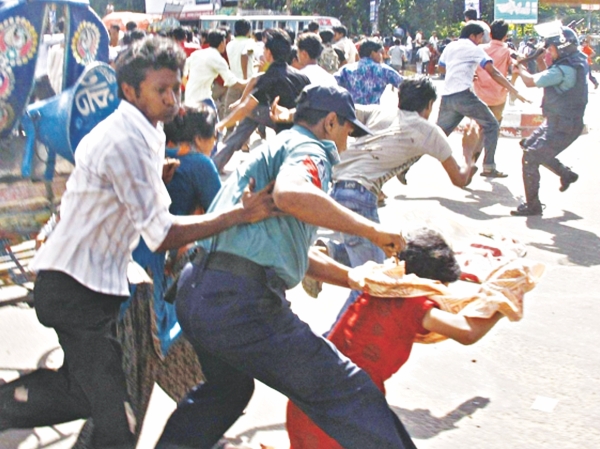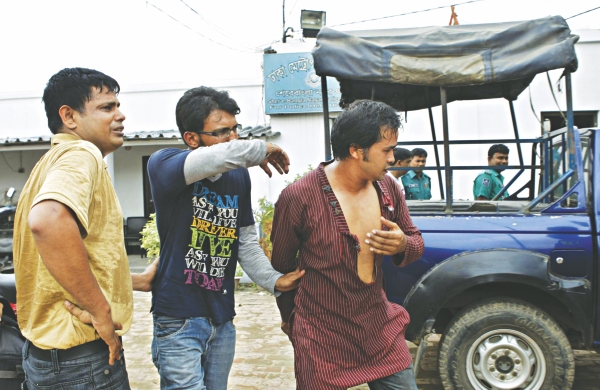
Inside
Original Forum |
| The Blunder Game -- Shakhawat Liton |
| Why Police are more Equal in Bangladesh -- Rifat Munim |
| Do we have an Independent Judiciary? -- Dr. Zahidul Islam Biswas |
| The Grameen Saga: A Nation's Bank of Pride -- Reaz Ahmad |
| The Rail Solution -- Asjadul Kibria |
Regional trade: Moving Towards Change --- Refayet Ullah Mirdha |
Popularising Science Education |
Enabling Entrepreneurial Ecosystems -- Susan Davis |
Rape in 1971 -- an Act of Genocide -- Buddhadeb Halder |
| The Madness that is Cinema -- Kajalie Shehreen Islam |
| When country overwhelms city -- Seema Nusrat Amin |
| Chile 1973, End of a Dream -- Syed Badrul Ahsan |
 Star Photo
Star Photo
Why police are more equal in Bangladesh
Some draconian laws and politicisation are behind the lack of accountability in the police force and other government agencies, argues RIFAT MUNIM.
Who'll enforce law on law-enforcers? When someone goes violent; when someone breaks a law, we know there are government agencies to contain those rowdy elements. But who's there when the responsible agencies themselves break a well-pronounced law trampling citizens' civic rights and going far beyond all norms and sense of decency? Who's there to snub them and put them in the dock when they violate human rights in ways that are patently punishable offence by the country's law? Aren't laws they enforce on others applicable to them as well?
These are the questions that should have been brought to the fore following some recent instances of police brutalities in Bangladesh that have clearly demonstrated the extent to which law-enforcers can go in abusing laws. The first one was an attack on three journalists in the line of duty in the last week of May and the second one on a young girl named Farzana and her parents around the same time. Three more journalists and two lawyers were also beaten up in the second case as they came forward to help.
In all three cases, police acted in the same arrogant, free-wheeling manner as if the phrase 'rule of law' has one meaning for us and an entirely different meaning for them; as if their insignia, their official tag has entitled them to coerce anyone into capitulating or for that matter, to fulfil any of their wishes even if it requires gratifying their sexual desires. And what is the place where this visceral wish was fulfilled? It was a Police club inside which Farzana was first dragged and then molested and robbed. But the part which terrifies all is the fact that the police club is located next to the Dhaka Magistrate's court which stands for justice and which states that all are equal in the eye of the law!
However reassuring it may sound theoretically, the picture is abysmally bleak in practice. In reality, police are more equal than others. That is precisely why no matter what crime one commits, he can go scot-free as long as he is a policeman, the all-cleansing and justifying tag. Except for one or two eye-washing cases, police officers or constables who acted far outside the bounds of law have remained untouched by law even though their crime was proved and brought to the court's notice by media. What can be truer in this context than the Orwellian dictum-- 'Some are more equal than others'?
So, the quintessential question here is what do we do about these rogue elements in the police force? And why do they remain at large even after violating laws? Aren't there any laws that address these issues?
Yes, there are laws but other relevant arrangements that are a part of the enforcement process stand in favour of the police. For example, any victim of unlawful police behaviour or torture can file a lawsuit against the perpetrator. But when one tries to do that on the grounds, s/he will have to deal with yet another police officer who will refuse to accept any case against his peer without providing any reason. This is what precisely happened when Farzana's mother tried to file a case with the Kotowali Police Station after the harassment and torture they had faced at the police club. Even after the High Court ruling and so much media focus, the duty officer had made her wait for six long hours before taking the case. It mattered very little that a team of Ain O Salish Kendra (ASK) lawyers was accompanying her. After going through so much in filing a case comes the hearing, involving witnesses to the crime. This raises another practical problem since no one wants to make enemies with the police. The reason cannot be simpler: A set of draconian laws. A victim can also go directly to a court in order to sue a police officer. But here again, none wants to incur the wrath of police by standing against them as a witness to their crime.
To top it all off, there is the political dimension: These days most police officers are politically backed. Say, for example, the case of Officer-in-Charge (OC) Salahuddin Khan who was present during Farzana's harassment. He hails from Gopalganj (the home town of the prime minister) and was an active member of Bangladesh Chhatra League in his youth, which is the students' wing of the Awami League, the biggest party in the ruling grand alliance. When corruption joins hands with all of these, the prospect of justice wears really thin.
Now one must ask what the crux of the problem is. Where has it all gone wrong? Evidently, politically recruited officers work at the mercy of the ruling party leaders, an unpleasant truth which points to a large part of the problem. But there is a bigger problem that we often overlook and that has entitled our police and other agencies to take up certain actions. These actions have earned them the reputation of 'licensed terrorist'.
 Star Photo
Star Photo
That bigger problem lies in some draconian (many righteously say black) laws. Section 54 of the Code of Criminal Procedure (CrCP) allows police to arrest anyone without a warrant while Section 167 of the CrCP allows them to take an accused into remand, thus opening the door to custodial torture and forced confession. Nevertheless, these sections do not allow any police officer to harass, torture or maltreat a suspect or an accused until remand is granted by a court. Therefore, what they did with Farzana's father was totally unlawful, leave alone the sexual harassment of Farzana and her mother. In other words, whether someone is guilty or not, police cannot subject anyone to any form of harassment, mental or physical, unless a court intervenes and grants a remand to that end. Question should still arise about the extent to which custodial torture in remand is appropriate because in the absence of a limit police can apply all their medieval torturing mechanisms which often have undesired consequences in the form of forced confession.
To our utter disappointment, however unpalatable it may sound, here lies the truth: If you are not a privileged person, this free-wheeling, unlawful style is the way police will adopt while going about their job. One can easily imagine how many are harassed and tortured like Farzana and her parents everyday all over the country. We get to know only about those to whom media reaches out.
These special powers are also reasons why no one wants to sue police or even stand against them as a witness. Only journalists have the guts to do so. That's why they are beaten up as frequently as possible. If it was not for the journalists, police would only have their political bosses to deal with.
These black laws are at the heart of the problem. If we really want a state where everyone is equal in the eyes of law and where human rights are upheld in the truest sense of its meaning, those sections of the CrCP and any similar law or act must be repealed in the first place. Human rights organizations ASK and BLAST have long been working to that end. Now it's time media also joined hands with them because as long as those sections are in force, clichéd phrases like 'accountability of police' will remain ridiculously ineffective, conferring on them infinite power and allowing them to arrest and torture anyone at their will, no matter whether the arrestees are guilty or not.
Rifat Munim is Senior Editorial Assistant, The Daily Star. Email: rifatmunim@gmail.com